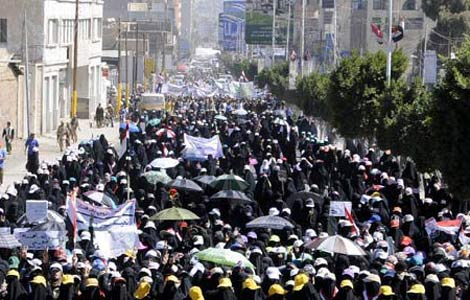Police asked to give family notice of detention
Updated: 2011-12-27 07:47
By Zhao Yinan and Cao Yin (China Daily)
|
|||||||||||
Reasons for arrest need not be released in some circumstances
BEIJING - A controversial draft article that could lead to someone's arrest without informing their family members is likely to be revised to meet social concerns about the abuse of police powers.
The draft amendment, while still allows police officers not to inform the relatives of suspects about their detention and arrest under some circumstances, requires public security departments to let the family members know "within 24 hours after the situation that could disrupt investigation disappears".
The disputed article, seen in the previous draft amendment to the Criminal Procedural Law submitted to lawmakers in August, allows public security departments not to inform the family members of suspects about the reason for arrest and place of detention when the suspects are under investigation for endangering State security or terrorism.
The article, after being discussed by top lawmakers at their bimonthly session in August, was put online to solicit public opinions.
About 80,000 pieces of feedback were received over a month-long period and many said they are concerned it may lead to abuse of police power.
Wang Minyuan, a legal researcher with the Chinese Academy of Social Sciences and deputy president of the criminal procedural law branch of the China Law Society, told China Daily the change to the law is a "progress".
Wang said there used to be no limit for public security departments if they refused to inform wrongdoers' relatives if a situation hinders investigation.
The proposed article set a time limit to "avoid the situations that the suspects just disappeared", Wang said.
In addition, the draft also proposed to abolish an existing article that said all the criminal cases involving foreigners should be heard at intermediate courts or above, signaling an "equal treatment for foreigners and Chinese citizens".
"It is a change in mindset," Wang said, adding that the existing requirements on cases involving foreigners are due to "capability of grassroots judges".
"In addition, to hear such cases at intermediate people's courts was in conformity with previous diplomatic situations, but as the number of criminal cases involving foreigners has increased in recent years and the ability of local judges has improved, it is reasonable to abolish such a stipulation," he said.
What's more, the draft amendment for the second reading put bonds, shares and funds on the list of assets that prosecutors and police are allowed to check and freeze, given that criminal suspects might have a variety of financial assets.
Li Shishi, director of the Legislative Affairs Commission of the National People's Congress Standing Committee, said that the latest stipulation was made under the consideration that criminal suspects might have a variety of financial assets.
The Criminal Procedural Law, adopted in 1979, was revised once in 1996.
Hot Topics
HIV/AIDS, Egypt protest, Thanksgiving, climate change, global economic recovery, home prices, high-speed railways, school bus safety, Libya situation, Weekly photos
Editor's Picks

|

|

|

|

|

|







